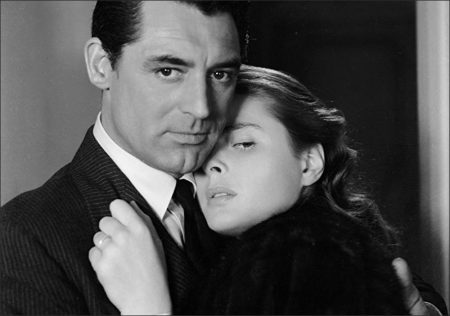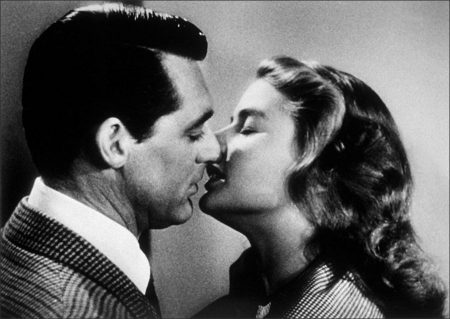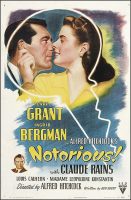Notorious (1946) is a classic Hitchcockian post-war psychological suspense/thriller. The basis of the film came from the 1921 Saturday Evening Post two-part short story “The Song of the Dragon” by John Taintor Foote. The master of suspense created a compelling spy mission interwoven with a romantic love story. The dark, intricate film is thematically concerned with both political (and sexual) betrayal and issues of trust, friendship, and duty embodied in the characters’ relationships.
It was remade in 1992 as a TV-movie, with John Shea as Devlin, Jenny Robertson as Alicia, Jean-Pierre Cassel as Sebastian, and Marisa Berenson as Katarina. Hitchcock tells the subtle tale of a beautiful but confused and agonized American spy (Ingrid Bergman) with a reputation for loose living as a playgirl (she is the American-born daughter of a convicted Nazi sympathizer) who unwillingly infiltrates an evil German cartel by marrying the Rio-based enemy leader living there incognito. A love triangle develops between three of the characters – the Nazi villain, a federal agent, and the woman.
After seducing (and betraying) her loving husband, she begins to feel perilous menace from both the man she really loves – an icy, seemingly insensitive and cruel American intelligence agent (Cary Grant) on the assignment – and her husband (Claude Rains), a man who is fixated with and controlled by his overcritical, partly-jealous mother figure (Leopoldine Konstantin). In the film’s twisted finale, Bergman is rescued before her untimely death from poisoning.
One of Hitchcock’s best and most popular films, his ninth American film, it is most notable for its use of a realistic MacGuffin – something around which the film’s plot revolves. In this film, the ‘red herring’ narrative device is a sample of uranium concealed in sand within wine bottles, a top-secret substance needed to manufacture an atomic weapon. The specific mention of uranium in Ben Hecht’s screenplay was timely and prescient – the atom bomb had just been dropped on Japan a few months before shooting began on the film. Originally, the MacGuffin for this film was to have been diamonds.
Another subtle symbol in the film is a key, and a third major motif is the drinking of lethal substances (either alcohol or poison) – to either seek refuge from reality or to bring harm. The most celebrated segments in the film are a marathon, prolonged erotic kissing scene (that circumvented the ‘three-second’ censor’s restrictions), a swooping camera crane shot down to an extreme closeup of the wine-cellar key held in Bergman’s hand (posters for the film always included a key motif), the wine-cellar sequence, and the suspenseful final scene with masterful inter-cutting.
As with many Hitchcock films, it was not lauded by its contemporary critics, and received only two Academy Award nominations: Best Supporting Actor (Claude Rains) and Best Original Screenplay (Ben Hecht). Stars Cary Grant (with his second of four appearances for Hitchcock) and Ingrid Bergman (with her second of three appearances), both at the height of their careers as a glamorous leading man and sultry beauty respectively, were denied nominations. The film’s producer, David O. Selznick, had originally wanted Vivien Leigh for Ingrid Bergman’s role.
Notorious (1946)
Directed by: Alfred Hitchcock
Starring: Cary Grant, Ingrid Bergman, Claude Rains, Louis Calhern, Leopoldine Konstantin, Reinhold Schünzel, Moroni Olsen, Ivan Triesault, Alexis Minotis, Wally Brown, Charles Mendl, Ricardo Costa
Screenplay by: Ben Hecht
Cinematography by: Ted Tetzlaff
Film Editing by: Theron Warth
Set Decoration by: Claude E. Carpenter, Darrell Silvera
Art Direction by: Carroll Clark, Albert S. D’Agostino
Makeup Department: Mel Berns
Music by: Roy Webb
Distributed by: RKO Radio Pictures
Release Date: September 6, 1946
Views: 189


